Can Oppression be a Chance for Transformation: Looking at Gender Aspects of Displacement Through Theatre
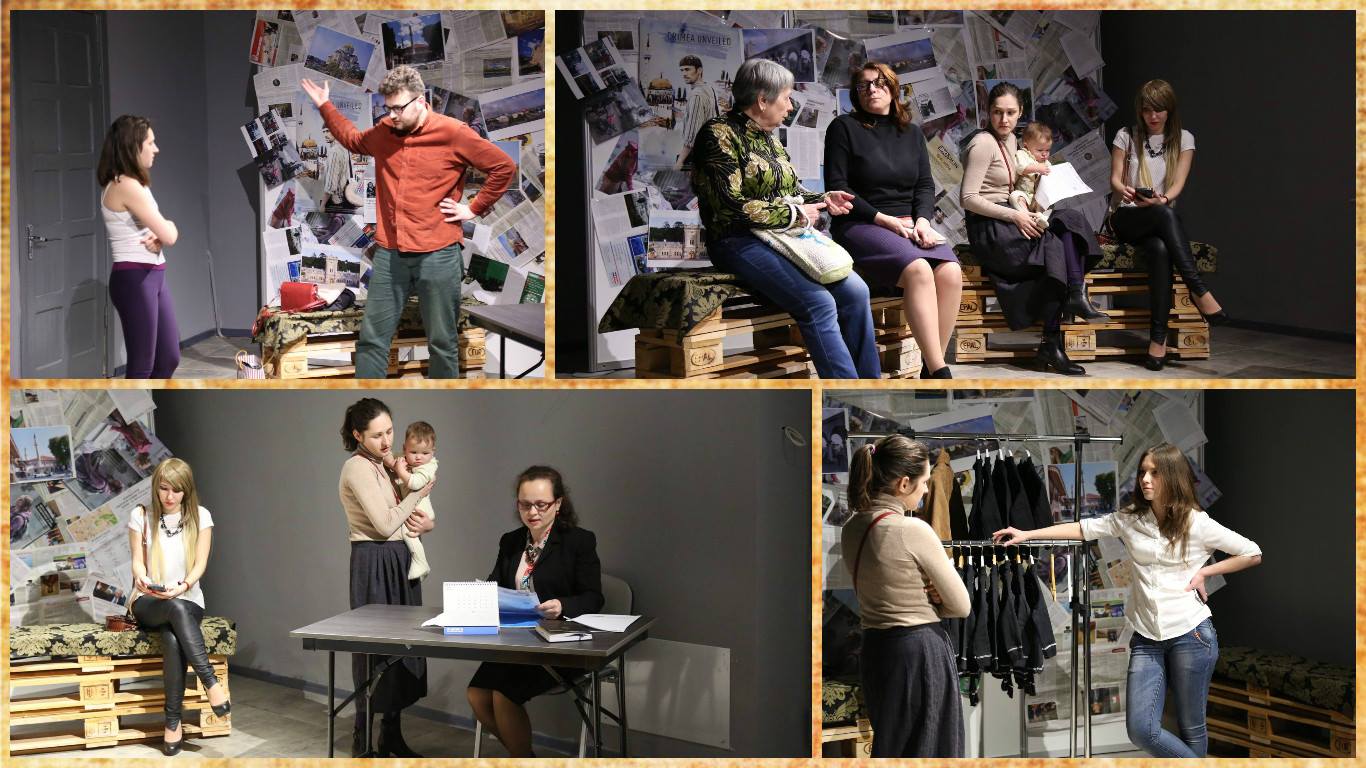
The article summarizes experience of a 3-month project with women-IDPs which aimed to make a forum-theatre play and led to creation of a Women’s club.
In January this year 23 women of different age, profession and ethnicity came together for a 3-day workshop on forum-theatre. Some of them even brought their little children with them and very quickly an inclusive space was created where both children and women of all ages felt comfortable to share and express themselves. The main thing which united these women was their experience of displacement – all of them have moved from the East of Ukraine or Crimea in the last two years due to the conflict in Ukraine.
The 3 days of work went by really fast. At the beginning many participants talked about the need to share their stories, a safe environment of women with similar experience, a place of belonging. We did a lot of playing, created images and stories, talked about our lives using theatre. The stories were not always “fun” – conflicts with family members over different political ideas; lack of employment, topped by the need to suddenly share a small flat with four other family members; lack of social connections, friends, colleagues, people to talk to, stigma and stereotypes – those were the main challenges that women brought up during the workshop. And yet, after challenging conversations about such topics, at the end of three days we created a play which we showed to a small audience of friends. The play showed a story of a woman with two small children who had just arrived to a big city, having to leave her home in Crimea due to political reasons. Not knowing anyone in the city, she goes to the state institutions (social services, state migration service) to ask for assistance, bringing her children along as she has no one to take care of them. However, long lines and unfriendly attitude of the staff force her to leave without getting held. She then meets other women-IDPs who had arrived before and already found their way around the city, they offer her help by means of a women’s club, but the woman is tired, skeptical and unwilling to receive help from “strangers” and she is left alone. The dialogue was intense, many questions were raised about the reasons for the attitude shown in the play, about structural causes of bureaucratic procedures, about roots of stereotypes and mistrust which is formed on individual and societal level, some but not all of them were answered. But most women testified feeling more uplifted, better understanding their challenges, having found new friends and a safe place where their stories can be heard. They all agreed that having such a place on a regular basis would be a gift to them. This was the start of a Women’s club for IDPs living in Kiev.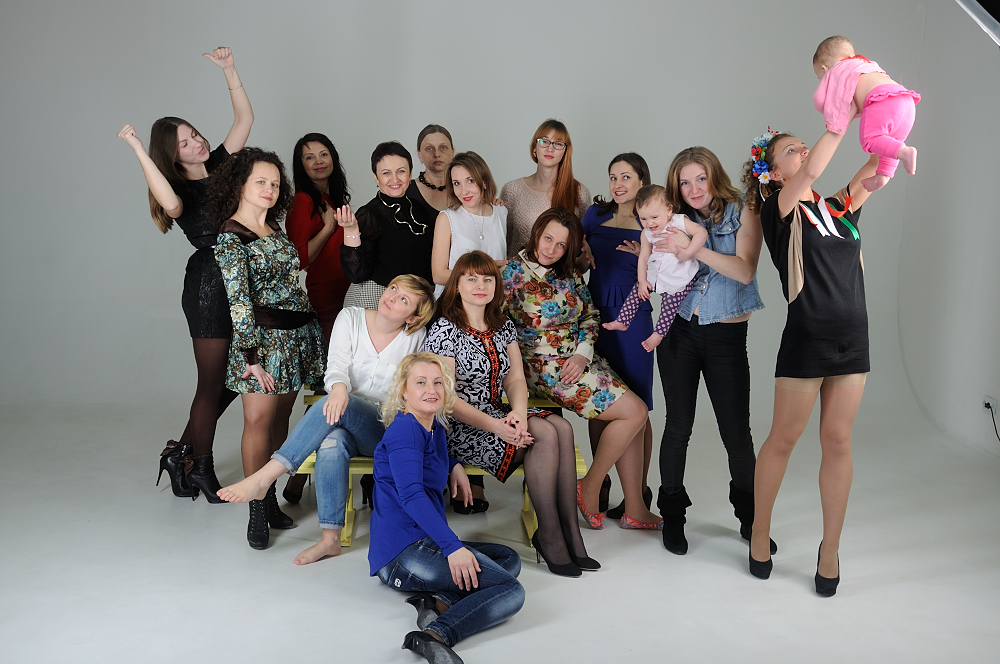
The club was initiated by women-IDPs themselves, with the intention of supporting each other and uniting to protect their common interests. So far the club has held 3 meetings, a training on emotional awareness, a tour around Kiev, a photo session, and also focused on creating a more detailed forum-theatre play about experience of women-IDPs. The play was developed and performed twice to an audience of other IDPs (men and women), local citizens, media and volunteers in Kiev. At this stage a group of women has taken initiative to support the club’s ongoing activities and organize regular events, which will include, among others, forum theatre and consciousness-raising conversations about gender.
The group also decided to create a more elaborate play which featured 8 women who combined their personal and collective experience in a story. It is a story of an average day of a young mom, who has recently moved to Kiev with her family. She lives with her husband and the son in a small flat. She wants to work but now she in unemployed and has no way of finding day care for her son. Her day starts with dreams and plans of how today she will get things done, she will find a job, and will finally have some time together with her husband. Instead, she faces aggressive attitude when she comes to the social services with her small child. The social worker is irritated by the baby and does not give the woman full information about the documents she needs to apply for government subsidy. As she leaves, the woman also hears comments about her IDP status from other people standing in line. She does not give up – her next destination is a job interview at a sports store. Even though she is inexperienced in the sector, the manager offers her a job, while promising low pay at first with “possibilities of a raise”, and also commenting on her looks and asking her to “take care of herself” so that she can "look more appropriate" in order to work with clients in this expensive store. With her Masters in Economics, the woman accepts the job as she hopes it will help her and her husband live better, perhaps rent a larger apartment and invite her mother (who stayed in Crimea) to live with them. Instead, when she comes home later than usual that night (because she was at the store training for her new job) her husband is rude, he does not believe her that this job is worthy (particularly because his wife has to wear tight sports uniform at work and that makes her “look inappropriate”). They fight, he raises his voice and the scene ends with the wife leaving the room with no decision about her new job. That is the end of the play…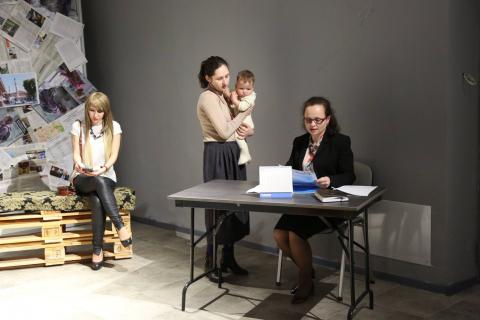
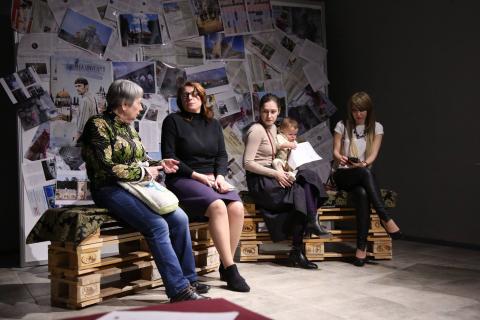
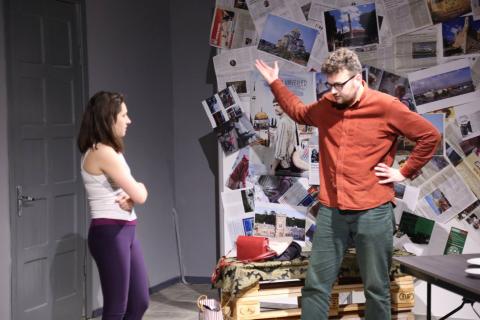
As the play was created, each woman found her place in the story, sometimes playing the very antagonist of herself. At times, the oppression was so strong that I, as a facilitator, exclaimed “No way! Could this be true?”. But the women assured me “This only happened to me yesterday”, or “I know someone who experienced this”. All stories were part of their collective and individual experience, and so they became part of the play.
We showed the play twice to a mixed audience in Kiev (men and women, IDPs and local population) and both times we heard very diverse comments, from “This is too strong. Life is not like that” to “This is my daily routine. I see such men and women on the streets everywhere”. We talked about “visible” and “invisible” oppression of women and men. Are stereotypes about a “real woman” or a “real man” oppressing us, or are they just “part of our culture”? Is it really normal for a man to feel “ownership” over his wife and dictate her how she looks and what she wears to work? Is it okay that women themselves oppress and discriminate other women by putting excessive beauty expectations on them, by creating job descriptions with age limits, by not being open to mothers with children, by being silent with each other about cases of domestic violence? 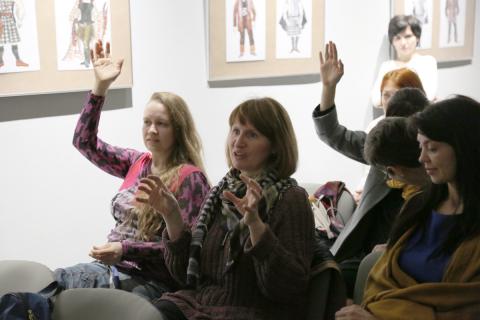
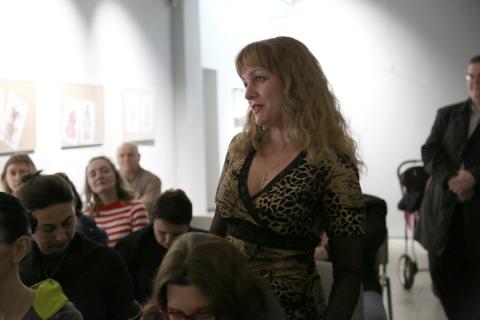
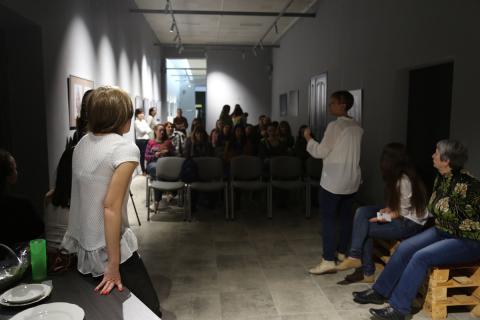
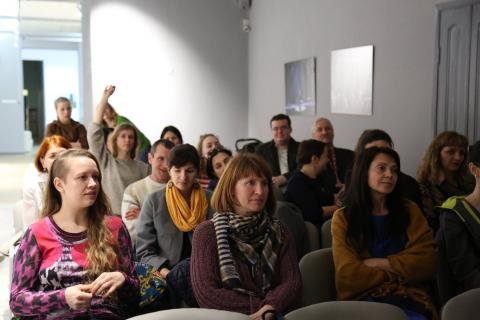
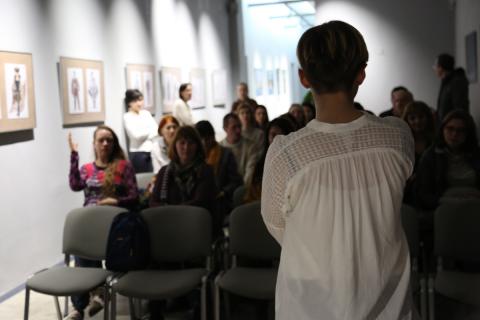
We only asked questions, the spectators offered answers. And the answers varied from strategies of assertiveness to kindness and manipulation; from dialogue and interest in others, to aggressive responses; from isolation to trying to see the common challenges that many people – IDPs and not – face together, such as bureaucracy, corruption, war trauma, etc. Men and women both came on stage to show a different style of communication between husband and wife, and soon most of the audience all agreed that it takes both a man and a woman to avoid conflict, and while men need to learn to talk about their feelings, women need to learn to take care of themselves and protect their boundaries when they are invaded; that violence is often “invisible” because we are so used to it, but unless we start to name it and call it for what it is, we will not be able to stop it. From challenges and oppressions we slowly came to visions - those of a society where people are in solidarity with each other, where women can freely choose to have children or not, to work or to stay home – and every choice is possible and welcome; where men can be vulnerable and can talk about relationships; where struggle for power is replaced with authentic dialogue.
Now, a few weeks later, I keep seeing and hearing from our women-participants “We finally had dinner together with my husband”, “I feel like I deserve a better job”, “My age should not limit my career options”, and many other statements, which had not been voiced even a few weeks ago. I see a situation of crisis that is turning into opportunities for these women and their families, thanks to collective action, solidarity and creativity. A “Chinese crisis”, which contains both a risk and an opportunity, is the foundational principle of forum-theatre. Today Ukrainian society is still battling through a crisis, and at times it seems endless and overwhelming. But based on our experience working with communities all over the country using theatre, I am convinced that we can turn this crisis into an opportunity, if we are brave enough to face the problems and look for solutions together. In fact, we are already doing that and seeing results. Now it’s just a matter of skill, perseverance and time until we see the change on a larger scale. 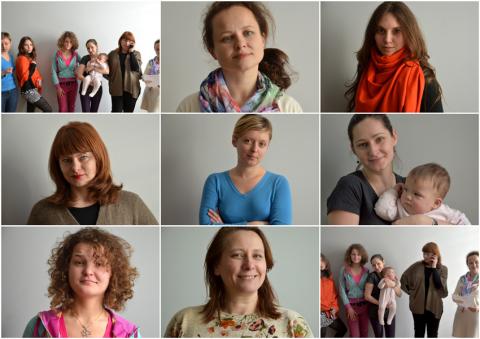


 Theatre for dialogue 2015 - 2019
Theatre for dialogue 2015 - 2019